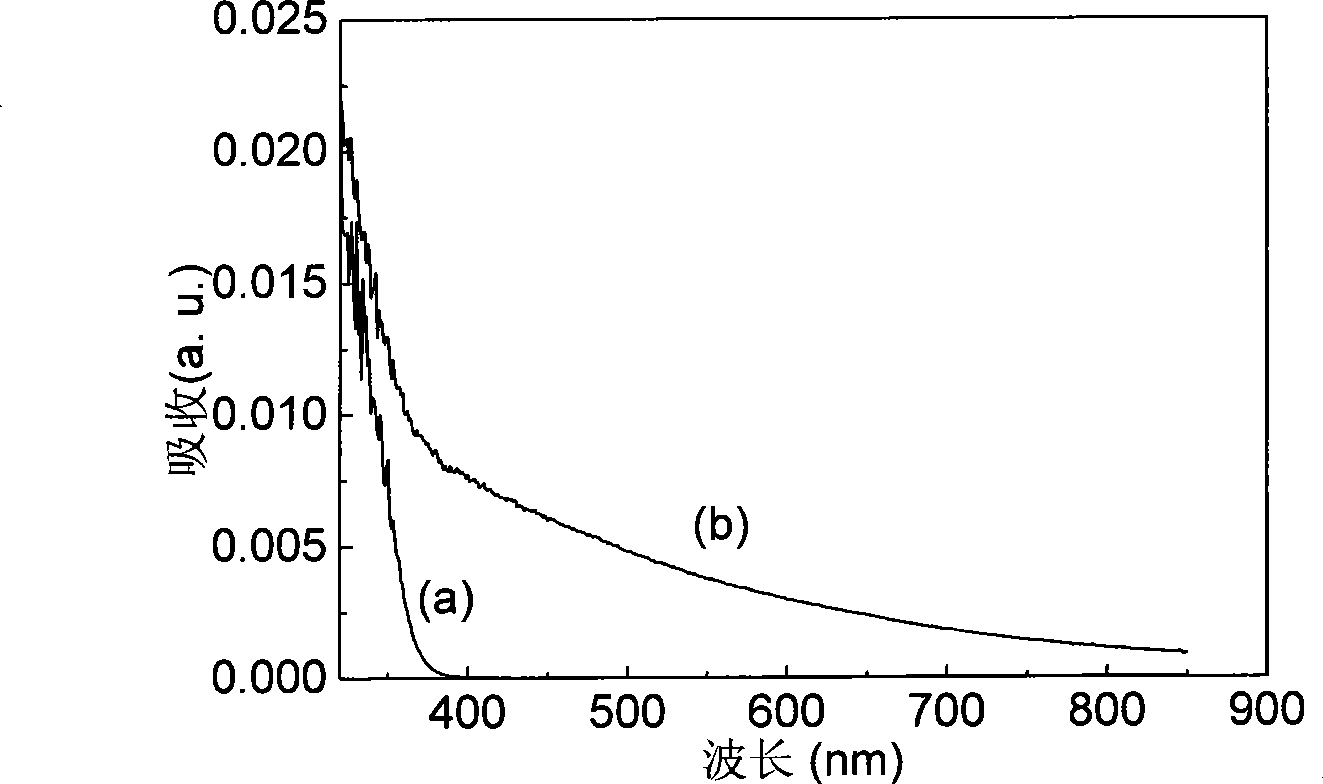Preparation method of photochemical catalyst activated carbon doped titanium dioxide nano material
A photocatalytic activity, nanomaterial technology, applied in the field of inorganic nanophotocatalytic materials, can solve the problems of complex process, increase product production cost, unfavorable large-scale preparation, etc., to simplify production process, reduce production cost, and improve light quantum efficiency. Effect
- Summary
- Abstract
- Description
- Claims
- Application Information
AI Technical Summary
Problems solved by technology
Method used
Image
Examples
Embodiment 1
[0024] Take 10ml of tetrabutyl titanate and add it dropwise into 10ml of water, then fully stir and mix for 30min to obtain a white precipitate. The above white precipitated substance was dried at 60° C. for 12 hours, and then ground to obtain a solid powder. The solid powder was heat-treated in an oxygen-deficient device, and calcined in an air atmosphere at 400° C. for 1 hour to obtain a gray-black powder. After the product is collected, it is washed with water and alcohol for 5 times by centrifugation, and then air-dried at 60° C. to obtain carbon-doped titanium dioxide nanopowder with stable performance. The ultraviolet-visible diffuse reflectance absorption spectrum of the prepared carbon-doped titanium dioxide nanopowder is as follows: figure 1shown. The performance test results of degrading methyl orange showed that the decolorization rate of methyl orange reached 92% under visible light for 120 minutes.
Embodiment 2
[0026] Take 10ml of tetraisopropyl titanate and add it dropwise into 20ml of water, then stir and mix thoroughly for 30min to obtain a white precipitate. The above white precipitated substance was dried at 80° C. for 24 hours, followed by grinding to obtain a solid powder. The solid powder was heat-treated in an oxygen deficient apparatus, and calcined in an air atmosphere at 300° C. for 1 hour to obtain an off-white powder. After the product is collected, it is washed with water and alcohol three times by centrifugation, and then air-dried at 60°C to obtain carbon-doped titanium dioxide nanopowder with stable performance. The performance test results of degrading methyl orange showed that the decolorization rate of methyl orange reached 86% under visible light for 120 minutes.
Embodiment 3
[0028] Take 10ml of tetrabutyl titanate and add it dropwise to 5ml of water, then stir and mix thoroughly for 30min to obtain a white precipitate. The above white precipitated substance was dried at 80° C. for 12 hours, followed by grinding to obtain a solid powder. The solid powder was heat-treated in an oxygen-deficient device, and calcined in an air atmosphere at 450° C. for 1 hour to obtain a white powder. After the product was collected, it was washed with water and alcohol three times by centrifugation, and then air-dried at 60° C. to obtain carbon-doped titanium dioxide nanopowder. The performance test results of degrading methyl orange showed that the decolorization rate of methyl orange reached 79% under visible light for 120 minutes.
PUM
| Property | Measurement | Unit |
|---|---|---|
| decolorization rate | aaaaa | aaaaa |
| decolorization rate | aaaaa | aaaaa |
| decolorization rate | aaaaa | aaaaa |
Abstract
Description
Claims
Application Information
 Login to View More
Login to View More - R&D
- Intellectual Property
- Life Sciences
- Materials
- Tech Scout
- Unparalleled Data Quality
- Higher Quality Content
- 60% Fewer Hallucinations
Browse by: Latest US Patents, China's latest patents, Technical Efficacy Thesaurus, Application Domain, Technology Topic, Popular Technical Reports.
© 2025 PatSnap. All rights reserved.Legal|Privacy policy|Modern Slavery Act Transparency Statement|Sitemap|About US| Contact US: help@patsnap.com

